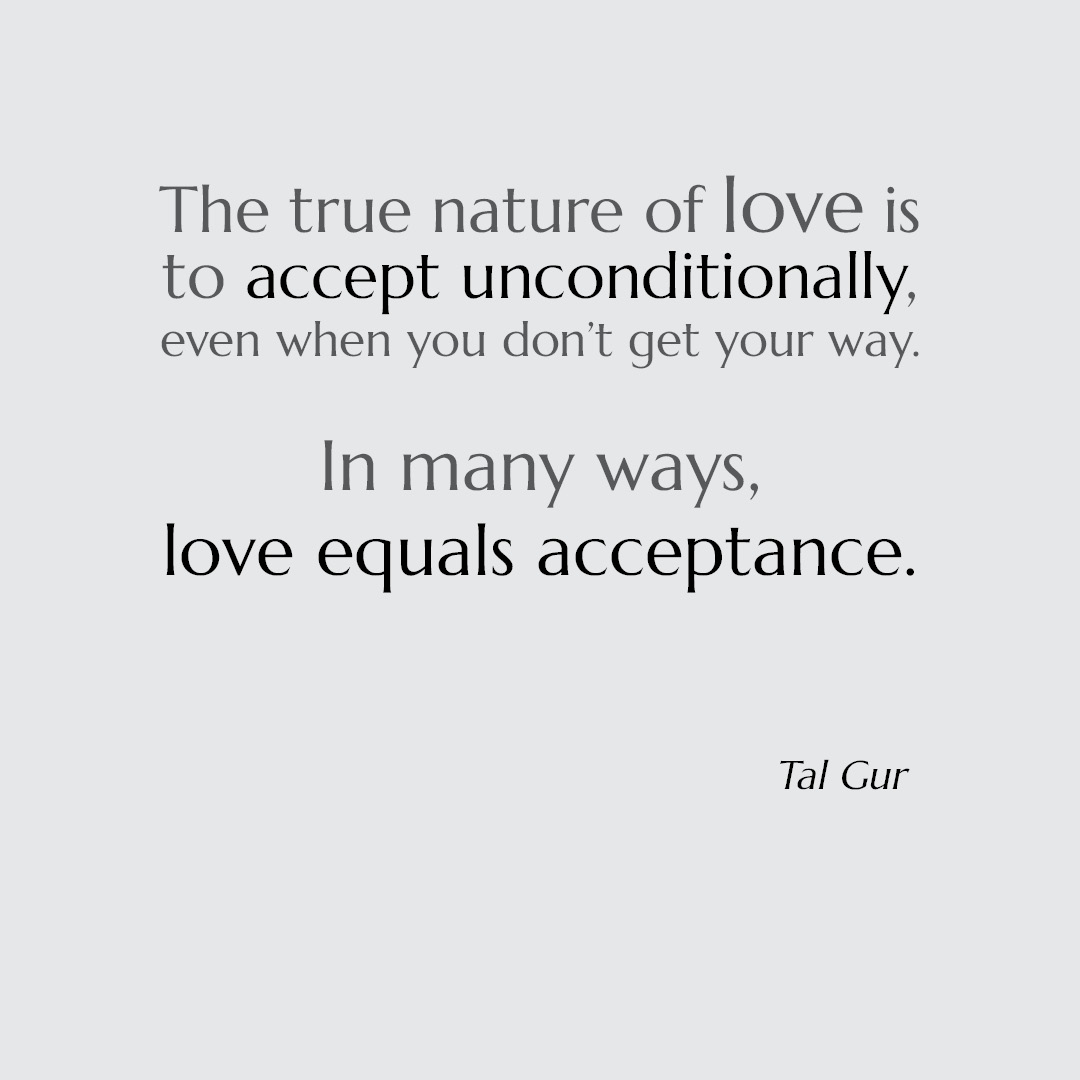The true nature of love is to accept unconditionally, even when you don’t get your way. In many ways, love equals acceptance.
Love is a powerful force that encompasses a vast range of emotions and experiences. At its core, love is about accepting someone unconditionally, without any expectations or demands. It goes beyond the realm of just receiving affection, and instead, it thrives on embracing the other person for who they truly are.
Imagine a situation where you deeply care for someone, whether it's a partner, a friend, or a family member. You genuinely love them, not because of what they can offer you or how they make you feel, but simply because of who they are as an individual. Love means accepting them in their entirety, with all their quirks, flaws, and imperfections.
But here's the catch: love isn't a one-way street. It requires reciprocity, understanding, and compromise. It means recognizing that you won't always get your way or have things exactly as you envision them. Love demands that you let go of your selfish desires and embrace the needs and wants of the other person. It's about valuing their happiness and well-being as much as your own.
In this sense, love and acceptance are intertwined. When you truly love someone, you accept them wholeheartedly, including their differences, opinions, and choices. You don't try to change or mold them into something that aligns with your own preferences. Instead, you appreciate their unique perspective and allow them to express themselves authentically.
This acceptance doesn't mean that you have to agree with everything the other person does or says. It means recognizing that they have their own journey, their own set of beliefs and values, which might differ from yours. Love encourages open-mindedness and respect, even in the face of disagreements or conflicts.
So, in many ways, love equals acceptance. It means setting aside your ego, relinquishing control, and embracing the unpredictable nature of human relationships. It requires patience, compassion, and a willingness to grow together. Love teaches us that true fulfillment lies not in having things exactly our way, but in creating an environment of unconditional acceptance where both individuals can flourish.
Ultimately, the true essence of love lies in accepting others as they are, without conditions or expectations. It's about nurturing a bond that thrives on mutual understanding and embracing each other's unique qualities. By embracing love as a force of acceptance, we can cultivate deep and meaningful connections that transcend superficial desires and pave the way for genuine happiness and fulfillment.
Is there a historical example that illustrates the message of the quote?
One historical example that illustrates the message of unconditional acceptance and love, even when one doesn't get their way, is the civil rights movement in the United States. During the mid-20th century, African Americans faced widespread discrimination and segregation, particularly in the Southern states.
One of the prominent leaders of the civil rights movement was Martin Luther King Jr., who advocated for equality, justice, and nonviolent resistance. His approach emphasized love, acceptance, and the belief in the inherent worth and dignity of every individual, regardless of their race.
Despite facing numerous challenges, including violence, arrests, and opposition from those who resisted change, the civil rights activists maintained a commitment to love and acceptance. They practiced nonviolent protests, sit-ins, and marches, all aimed at challenging the unjust laws and policies that perpetuated racial inequality.
Their actions were grounded in the belief that true change comes from acceptance and love rather than hatred or retaliation. They aimed to bridge the racial divide by appealing to the moral conscience of both the oppressors and the general public, seeking to create understanding and empathy.
Their unwavering commitment to acceptance, even in the face of immense adversity, eventually led to significant advancements in civil rights legislation, such as the Civil Rights Act of 1964 and the Voting Rights Act of 1965. These laws helped dismantle institutionalized segregation and discrimination, paving the way for a more inclusive and equitable society.
The civil rights movement serves as a powerful historical example that demonstrates how love and acceptance, even when one's desires are not immediately fulfilled, can bring about transformative social change and create a more just and compassionate world.
*To obtain more inspiration and motivation to achieve your goals, you definitely want to check out my extensive list of growth goals. This page contains SMART goal ideas that can help you establish new aspirations and attain greater heights in your personal growth journey. I utilized this page myself to create my own list of 100 life goals, which I dedicated a decade to pursuing.
Chief Editor
 Tal Gur is an author, founder, and impact-driven entrepreneur at heart. After trading his daily grind for a life of his own daring design, he spent a decade pursuing 100 major life goals around the globe. His journey and most recent book, The Art of Fully Living, has led him to found Elevate Society.
Tal Gur is an author, founder, and impact-driven entrepreneur at heart. After trading his daily grind for a life of his own daring design, he spent a decade pursuing 100 major life goals around the globe. His journey and most recent book, The Art of Fully Living, has led him to found Elevate Society.























